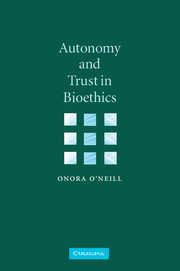Book contents
- Frontmatter
- Contents
- Preface
- Frontispiece
- 1 Gaining autonomy and losing trust?
- 2 Autonomy, individuality and consent
- 3 ‘Reproductive autonomy’ and new technologies
- 4 Principled autonomy
- 5 Principled autonomy and genetic technologies
- 6 The quest for trustworthiness
- 7 Trust and the limits of consent
- 8 Trust and communication: the media and bioethics
- Bibliography
- Institutional bibliography
- Index
3 - ‘Reproductive autonomy’ and new technologies
Published online by Cambridge University Press: 06 November 2009
- Frontmatter
- Contents
- Preface
- Frontispiece
- 1 Gaining autonomy and losing trust?
- 2 Autonomy, individuality and consent
- 3 ‘Reproductive autonomy’ and new technologies
- 4 Principled autonomy
- 5 Principled autonomy and genetic technologies
- 6 The quest for trustworthiness
- 7 Trust and the limits of consent
- 8 Trust and communication: the media and bioethics
- Bibliography
- Institutional bibliography
- Index
Summary
AUTONOMY AND TWENTIETH-CENTURY REPRODUCTION
In contemporary medical practice patient autonomy is often no more than a right to refuse treatment. This right is important. Insofar as patients are protected by informed consent procedures that are scrupulously used, they will be protected against coercive or deceptive medical treatment. However, by themselves informed consent procedures neither assume nor ensure that patients are autonomous in any more demanding sense. Patients who give or withhold informed consent may or may not have extensive capacities for self-determination, for reflective evaluation, or for independence. If they have any of these capacities, they may make little use of them in consenting or withholding consent from treatment.
This limited focus on informed consent, rather than on any more extensive conception of autonomy, serves reasonably well in medical ethics because it suits the real context of illness and injury. When we are patients we are not well placed to exercise any very demanding form of autonomy. As the very etymology of the word patient suggests, patients are likely to find robust forms of autonomy taxing if not impossible. Even informed consent procedures can be strenuous for the seriously ill or injured.
More demanding conceptions of individual autonomy may still be important in bioethics. Perhaps we need robust and distinctive capacities for autonomy if we are to make certain significant life choices of the types made available by new biotechnologies.
- Type
- Chapter
- Information
- Autonomy and Trust in Bioethics , pp. 49 - 72Publisher: Cambridge University PressPrint publication year: 2002
- 1
- Cited by



